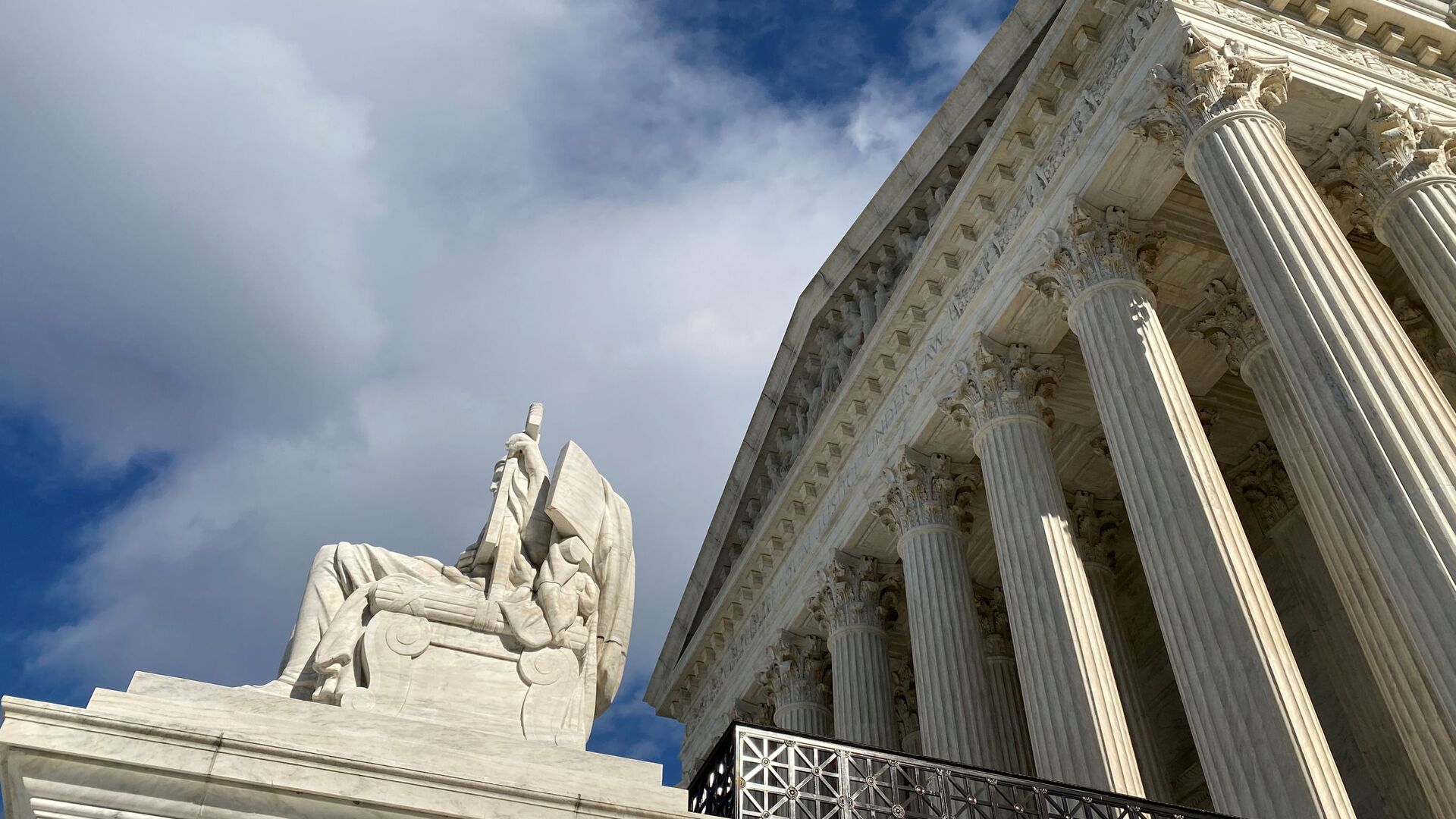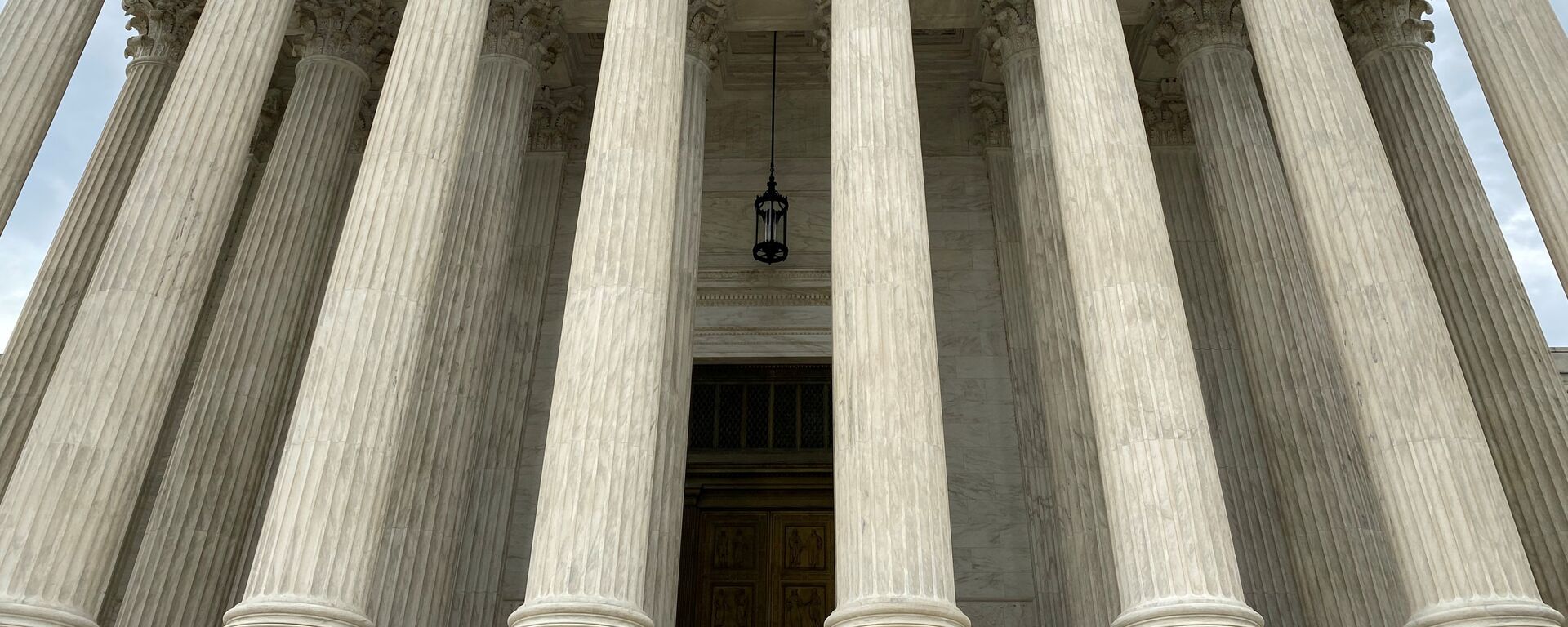https://sputnikglobe.com/20210912/clinton-appointed-supreme-court-justice-dismisses-democrats-proposal-to-expand-scotus-1089016057.html
Clinton-Appointed Supreme Court Justice Dismisses Democrats’ Proposal to Expand SCOTUS
Clinton-Appointed Supreme Court Justice Dismisses Democrats’ Proposal to Expand SCOTUS
Sputnik International
In April, the Biden administration formed a 36-member bipartisan commission to examine the pros and cons of reforming the Supreme Court and increasing the... 12.09.2021, Sputnik International
2021-09-12T19:02+0000
2021-09-12T19:02+0000
2021-09-12T19:16+0000
joe biden
bill clinton
supreme court
https://cdn1.img.sputnikglobe.com/img/107815/57/1078155773_0:388:2731:1924_1920x0_80_0_0_c5bc79c60b812d653c9e5aa11e8e3567.jpg
Bill Clinton-appointed Supreme Court Justice Stephen Breyer has stepped out against Democratic-led efforts to increase the number of justices in the court, suggesting that if the party attempts to expand its membership, Republicans could do the same thing, causing a potential crisis.Breyer, who recently published a book entitled ‘The Authority of the Court and the Peril of Politics’, in which he argues strongly against the politicization of the Supreme Court, recalled that President Alexander Hamilton, one of America’s Founding Fathers, envisioned the court’s role as an institution determining whether laws or policies passed or implemented by the legislative and executive branches are constitutional.The justice suggested that Americans “understand to some degree why it’s a good idea what Hamilton thought,” and that the court was necessary precisely for this reason.The 83-year-old justice, appointed by President Clinton in 1994, suggested that one reform may be beneficial – namely term limits. “I think you could do that. It should be a very long term because you don’t want the judge who’s holding that term to start thinking about his next job. But it would make life easier for me,” he said.Breyer said he doesn’t intend to follow the examples set by conservative justice Antonin Scalia or liberal justice Ruth Bader Ginsburg, who died in office, and hinted that he would retire at some point.Breyer is one of just three justices in the Supreme Court appointed by Democrats, with the other two, Justice Sonia Sotomayor and Justice Elena Kagan, appointed by President Barack Obama. Conservative Justice Clarence Thomas was appointed by George H.W. Bush all the way back in 1991, with two more justices appointed by his son George W. Bush, and three picked by Donald Trump.On the campaign trail, Joe Biden hinted his support for ‘court packing’, or increasing the number of Supreme Court justices from the current 9 to 13 or even 15, to alleviate the perceived imbalance between conservative and liberal justices. In April, Biden ordered the creation of a presidential commission on SCOTUS’s possible expansion. Polling by Reuters found that 38 percent of respondents to be in favour of adding more justices to the court, with 42 percent expressing opposition, and the remainder being undecided.The Biden commission is expected to report back in October with its weighted analysis of five subjects, and in addition to the number of justices, is set to comment on topics including the genesis of the SCOTUS reform debate, the court’s role in the constitutional system, the length of service of its justices, and the court’s case selection, rules and practices.
https://sputnikglobe.com/20210419/majority-of-americans-think-lifetime-supreme-court-judges-terms-should-be-abolished---report-1082666829.html
Sputnik International
feedback@sputniknews.com
+74956456601
MIA „Rosiya Segodnya“
2021
News
en_EN
Sputnik International
feedback@sputniknews.com
+74956456601
MIA „Rosiya Segodnya“
Sputnik International
feedback@sputniknews.com
+74956456601
MIA „Rosiya Segodnya“
joe biden, bill clinton, supreme court
joe biden, bill clinton, supreme court
Clinton-Appointed Supreme Court Justice Dismisses Democrats’ Proposal to Expand SCOTUS
19:02 GMT 12.09.2021 (Updated: 19:16 GMT 12.09.2021) In April, the Biden administration formed a 36-member bipartisan commission to examine the pros and cons of reforming the Supreme Court and increasing the number of justices. Currently, six of the court’s nine justices are Republican appointees, with just three appointed by Democrats.
Bill Clinton-appointed Supreme Court Justice Stephen Breyer has stepped out against Democratic-led efforts to increase the number of justices in the court, suggesting that if the party attempts to expand its membership, Republicans could do the same thing, causing a potential crisis.
“Well, if one party could [expand the court], I guess another party could do it,” Breyer
said, speaking to Fox News Sunday. “On the surface, it seems to me you start changing all these things around and people will lose trust in the court,” the justice warned.
Breyer, who recently published a book entitled ‘The Authority of the Court and the Peril of Politics’, in which he argues strongly against the politicization of the Supreme Court, recalled that President Alexander Hamilton, one of America’s Founding Fathers, envisioned the court’s role as an institution determining whether laws or policies passed or implemented by the legislative and executive branches are constitutional.
The justice suggested that Americans “understand to some degree why it’s a good idea what Hamilton thought,” and that the court was necessary precisely for this reason.
The 83-year-old justice, appointed by President Clinton in 1994, suggested that one reform may be beneficial – namely term limits. “I think you could do that. It should be a very long term because you don’t want the judge who’s holding that term to start thinking about his next job. But it would make life easier for me,” he said.
Breyer said he doesn’t intend to follow the examples set by conservative justice Antonin Scalia or liberal justice Ruth Bader Ginsburg, who died in office, and hinted that he would retire at some point.
The justice agreed that today’s Supreme Court has become extremely politicized, suggesting that he definitely wouldn’t receive the 87-9 Senate approval he did in the 1990s during his confirmation if he were up for confirmation today. “That’s the political environment. Now you may disapprove of it, I may disapprove of it, and if enough people in the public want it to change or be modified one way or the other, it will be,” he stressed.
Breyer is one of just three justices in the Supreme Court appointed by Democrats, with the other two, Justice Sonia Sotomayor and Justice Elena Kagan, appointed by President Barack Obama. Conservative Justice Clarence Thomas was appointed by George H.W. Bush all the way back in 1991, with two more justices appointed by his son George W. Bush, and three picked by Donald Trump.
On the campaign trail, Joe Biden
hinted his support for ‘court packing’, or increasing the number of Supreme Court justices from the current 9 to 13 or even 15, to alleviate the perceived imbalance between conservative and liberal justices. In April, Biden ordered the creation of a
presidential commission on SCOTUS’s possible expansion. Polling by Reuters found that 38 percent of respondents to be in favour of adding more justices to the court, with 42 percent expressing opposition, and the remainder being undecided.
The Biden commission is expected to report back in October with its
weighted analysis of five subjects, and in addition to the number of justices, is set to comment on topics including the genesis of the SCOTUS reform debate, the court’s role in the constitutional system, the length of service of its justices, and the court’s case selection, rules and practices.




